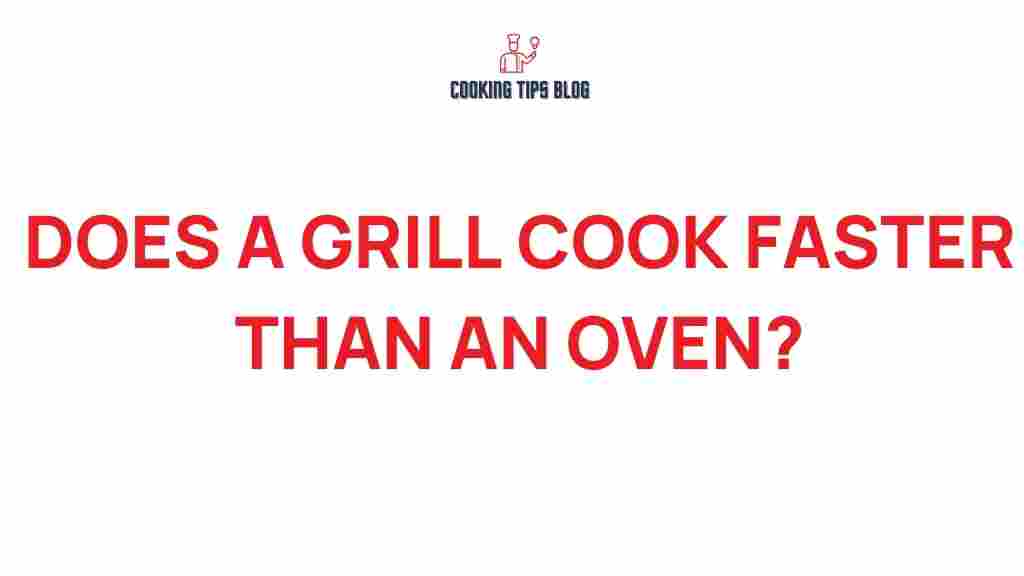Does a Grill Really Cook Faster Than an Oven? The Surprising Truth About Grill Cooking
When it comes to preparing delicious meals, many home chefs often find themselves torn between using a grill or an oven. Both methods have their unique advantages and disadvantages, but one question frequently arises: does a grill really cook faster than an oven? In this article, we will explore the differences in cooking times, techniques, and the science behind grill cooking compared to oven cooking. We’ll also provide troubleshooting tips and guide you on which method might be best for your specific needs.
Understanding Grill Cooking
Grill cooking involves exposing food to direct heat, either from below (charcoal or gas grill) or from above (broiler). This method can impart unique flavors, especially when using charcoal or wood chips, which can enhance the taste of the food significantly. But how does this compare to oven cooking?
Cooking Times: Grill vs. Oven
Generally, grill cooking can be faster than using an oven. Here’s a breakdown of some common cooking times:
- Steaks: Grill cooking takes about 6-8 minutes for medium-rare, while an oven can take up to 15-20 minutes.
- Chicken: On the grill, chicken breasts typically cook in 10-15 minutes; in the oven, they could take 25-30 minutes.
- Vegetables: Grilling veggies usually takes 5-10 minutes, while roasting them in the oven can take 20-30 minutes.
As you can see, grill cooking often results in shorter cooking times, but several factors influence this. Let’s explore those factors in greater detail.
Factors Affecting Cooking Time
Several elements can influence how quickly food cooks on a grill compared to an oven:
- Heat Source: Grills use direct heat that can reach higher temperatures than most home ovens.
- Airflow: Grills allow for better airflow, which can cook food faster, while ovens may require more time for convection.
- Food Thickness: Thicker cuts of meat may take longer to grill compared to thinner cuts.
Understanding these factors can help you optimize your grill cooking for faster meal preparation. But there are also specific techniques you can employ to hasten the process.
Techniques for Faster Grill Cooking
To maximize the efficiency of your grill cooking, consider the following techniques:
1. Preheat Your Grill
Just like an oven, preheating your grill is crucial for reducing cooking time. Aim to preheat for at least 10-15 minutes before placing your food on the grates.
2. Cut Food Into Smaller Pieces
Smaller pieces cook faster than larger ones. If you’re grilling chicken, consider cutting it into smaller sections or using skewers for quicker cooking.
3. Use a Two-Zone Fire
Creating a two-zone fire allows you to sear food on high heat and then move it to a cooler area to finish cooking. This method can significantly reduce overall cooking time.
4. Keep the Lid Closed
Keeping the grill lid closed helps maintain heat and cook food more evenly, reducing cooking time compared to leaving it open.
5. Use a Meat Thermometer
Using a meat thermometer ensures that your food is cooked to the right temperature without overcooking, allowing for quicker preparation and serving times.
Troubleshooting Common Grill Cooking Issues
Even with the best techniques, issues may arise while grill cooking. Here are some common problems and solutions:
1. Uneven Cooking
If your food is cooking unevenly, consider:
- Rotating the food halfway through cooking.
- Using a two-zone fire to manage heat better.
2. Food Sticking to the Grill Grates
To prevent sticking:
- Ensure your grill is clean and well-oiled before cooking.
- Let the food sear for a few moments before trying to flip it.
3. Flare-Ups
If you encounter flare-ups, remove the food from the direct heat and close the lid to reduce oxygen until the flames die down.
4. Overcooked Meat
Avoid overcooking by:
- Using a meat thermometer to check doneness.
- Marinating your meat to add moisture.
Grill Cooking vs. Oven Cooking: Nutritional Aspects
Another factor to consider is the nutritional value of foods prepared on a grill versus those cooked in an oven. Grill cooking often allows fat to drip away from the food, potentially reducing calorie content. However, the method of cooking can also affect the nutrient density of certain foods. Here’s how:
- Grilling: Can lock in flavors and nutrients, especially when cooking vegetables.
- Oven Cooking: May lead to loss of some nutrients, particularly when cooking at high temperatures for extended periods.
Ultimately, the choice between grill cooking and oven cooking may depend on personal preferences and dietary goals.
Conclusion: Choosing the Right Cooking Method
So, does a grill really cook faster than an oven? The answer is often yes, but it depends on various factors, including the type of food, cooking techniques, and personal experience with each method. Grill cooking typically provides quicker cooking times and delicious smoky flavors, making it a favored choice for many home cooks.
Understanding the nuances of both grill and oven cooking can help you become a more versatile chef, allowing you to create a wide array of meals with ease. Whether you’re using a grill for your next BBQ or baking in the oven, both methods have their unique benefits.
For more cooking tips and recipes, check out our cooking blog or visit this external resource for in-depth guides on grill cooking!
This article is in the category Tools and created by Cookingtipsblog Team
